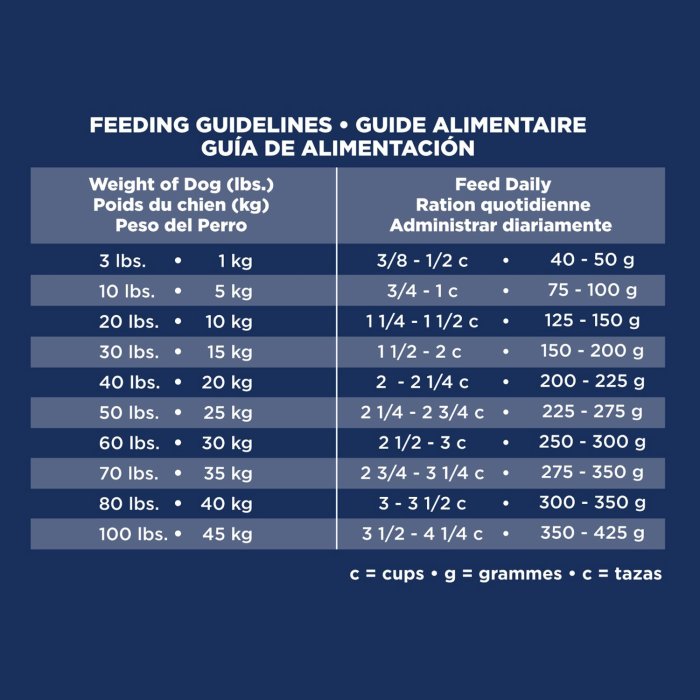Beagle Nutritional Needs

Beagles nutrition facts food – Understanding a beagle’s nutritional requirements is crucial for ensuring their health, vitality, and longevity. A well-balanced diet provides the necessary energy for their playful nature and supports their overall well-being, contributing to a happy and healthy life. Factors like age, weight, activity level, and any underlying health conditions significantly influence their daily caloric intake and the specific balance of nutrients needed.
Daily Caloric Needs
The daily caloric needs of a beagle vary considerably depending on several key factors. Providing the right amount of energy is essential to prevent both obesity and malnutrition. The following table offers a general guideline, but individual needs may differ. Consult with your veterinarian for personalized recommendations.
| Age Range | Weight Range (lbs) | Activity Level | Daily Calorie Estimate |
|---|---|---|---|
| Puppy (3-6 months) | 5-15 | High | 500-800 |
| Puppy (6-12 months) | 10-20 | Moderate | 700-1200 |
| Adult (1-7 years) | 18-25 | Low | 800-1000 |
| Adult (1-7 years) | 18-25 | Moderate | 1000-1400 |
| Adult (1-7 years) | 18-25 | High | 1400-1800 |
| Senior (7+ years) | 18-25 | Low | 700-900 |
Note: These are estimates. A lean, highly active beagle will require more calories than a heavier, less active beagle of the same age. Calorie needs can also be influenced by factors such as environmental temperature and underlying health conditions.
Macronutrient Proportions
Maintaining the correct balance of macronutrients—protein, fat, and carbohydrates—is paramount for a beagle’s optimal health. These nutrients provide the building blocks for cells, energy for activity, and support various bodily functions.Protein is essential for muscle development and repair, as well as immune function. A high-quality protein source is crucial. Fat provides energy, aids in nutrient absorption, and contributes to a healthy coat and skin.
Carbohydrates offer a readily available source of energy. The ideal proportions generally fall within these ranges:
Protein: 22-30% of total daily calories. This ensures adequate muscle mass and supports a strong immune system. Examples of good protein sources include chicken, beef, lamb, and fish.
Fat: 15-20% of total daily calories. This provides energy and supports healthy skin and coat. Healthy fats include those found in fish oil and chicken fat.
Carbohydrates: 45-55% of total daily calories. These provide a readily available source of energy. Choose complex carbohydrates like brown rice, sweet potatoes, and barley over simple sugars.
Sample Daily Feeding Schedule (Adult Beagle, Moderate Activity), Beagles nutrition facts food
A consistent feeding schedule promotes healthy digestion and prevents overeating. For an adult beagle weighing approximately 20 lbs with moderate activity, a sample schedule could look like this:Morning (7:00 AM): 1 cup of high-quality dry kibble. This provides energy for the morning activities. Imagine a vibrant, energetic beagle ready for a walk after this nutritious meal.Afternoon (1:00 PM): ½ cup of high-quality dry kibble.
This replenishes energy reserves mid-day. Picture a happy beagle relaxing after a satisfying meal.Evening (6:00 PM): ½ cup of high-quality dry kibble. This provides sustenance before bedtime, allowing for a restful night’s sleep. Visualize a content beagle settling down for the night after a comforting meal.Note: Adjust portion sizes based on your beagle’s weight, activity level, and body condition.
Always provide fresh, clean water throughout the day.
Beagle-Specific Food Ingredients

Choosing the right ingredients for your beagle’s food is crucial for their overall health and well-being. A balanced diet, tailored to their specific nutritional needs, ensures optimal growth, energy levels, and a strong immune system. Understanding the benefits and drawbacks of various protein sources, carbohydrates, and essential micronutrients is key to making informed decisions about your beagle’s food.
Protein Sources in Beagle Food
Protein forms the building blocks of a beagle’s muscles, tissues, and organs. Different protein sources offer varying nutritional profiles. Chicken, a popular choice, is highly digestible and a good source of essential amino acids. However, some beagles may have chicken allergies, necessitating alternative options. Beef, another common protein, is rich in iron and protein but can be more expensive and potentially less digestible than chicken for some beagles.
Lamb is a lean protein source, often hypoallergenic, making it suitable for beagles with sensitivities. Fish, particularly salmon, provides omega-3 fatty acids beneficial for skin and coat health, but should be carefully sourced to avoid mercury contamination. The ideal protein source will depend on your individual beagle’s needs and tolerances.
Essential Vitamins and Minerals for Beagles
Vitamins and minerals play vital roles in numerous bodily functions. Vitamin A, crucial for vision and immune function, is often found in liver and leafy green vegetables. Vitamin K, essential for blood clotting, is present in many green vegetables. Calcium and phosphorus are vital for strong bones and teeth, with appropriate ratios crucial to prevent skeletal issues. A deficiency in any of these can lead to various health problems.
Therefore, ensuring your beagle’s food contains a balanced and adequate supply of these essential micronutrients is paramount. A veterinarian can help determine if supplementation is necessary.
Carbohydrate Sources in Beagle Diets
Carbohydrates provide energy for your beagle’s daily activities. Different carbohydrate sources vary in their digestibility and impact on energy levels. Grains like brown rice and oats are generally well-tolerated and offer sustained energy release. However, some beagles may have sensitivities to certain grains, requiring grain-free alternatives. Vegetables such as sweet potatoes and carrots offer fiber, vitamins, and minerals, promoting healthy digestion.
The best carbohydrate sources are those that are highly digestible, providing sustained energy without causing digestive upset. Overreliance on highly processed carbohydrates should be avoided.
Supplementing a Beagle’s Diet: Beagles Nutrition Facts Food
A balanced, high-quality diet forms the cornerstone of a beagle’s health. However, certain circumstances may necessitate the addition of dietary supplements to address specific nutritional gaps or support overall well-being. Understanding when and how to supplement your beagle’s diet is crucial for ensuring their optimal health and longevity. Improper supplementation can be harmful, so careful consideration and veterinary guidance are paramount.Supplementing a beagle’s diet should always be done under the strict supervision of a veterinarian.
They can assess your dog’s individual needs, considering factors like age, activity level, health conditions, and current diet, to determine if supplementation is necessary and, if so, which supplements are appropriate and the correct dosage. Never self-diagnose or begin supplementing without professional veterinary advice.
Dietary Supplements for Beagles
Dietary supplements can play a beneficial role in supporting various aspects of a beagle’s health. However, it’s crucial to understand that they are not a replacement for a complete and balanced diet. Instead, they should be viewed as complementary additions to address specific needs.
- Joint Supplements (e.g., Glucosamine, Chondroitin): These supplements are often given to beagles, particularly older ones or those with a predisposition to joint issues like hip dysplasia. Glucosamine and chondroitin are naturally occurring compounds that support cartilage health and reduce inflammation, potentially easing joint pain and stiffness. Potential risks: While generally safe, some beagles may experience mild gastrointestinal upset. Always start with a low dose and monitor your dog closely.
- Probiotics: These beneficial bacteria help maintain a healthy gut microbiome, aiding digestion and supporting immune function. Beagles prone to digestive upset or those recovering from illness may benefit from probiotics. Potential risks: Generally well-tolerated, but in rare cases, probiotics may cause mild gas or diarrhea. Choose high-quality probiotic products specifically formulated for dogs.
- Omega-3 Fatty Acids (e.g., Fish Oil): These essential fatty acids possess anti-inflammatory properties and contribute to healthy skin and coat. They can also support cognitive function and cardiovascular health. Potential risks: Excessive intake can lead to gastrointestinal upset or interact with certain medications. Always follow the recommended dosage.
- Vitamin and Mineral Supplements: If a veterinarian determines that your beagle has a deficiency in specific vitamins or minerals, they may recommend targeted supplementation. This is usually based on blood tests or other diagnostic assessments. Potential risks: Over-supplementation can be toxic, highlighting the importance of veterinary guidance. Each vitamin and mineral has specific potential side effects, so a veterinarian can guide you.
The Importance of Veterinary Consultation
Before introducing any supplements to your beagle’s diet, a comprehensive consultation with your veterinarian is absolutely essential. They can assess your beagle’s overall health, conduct necessary tests to identify any deficiencies, and determine the appropriate type and dosage of supplements. This prevents potential adverse reactions and ensures that supplementation is both safe and effective. Ignoring this crucial step could inadvertently harm your beloved companion.
Balancing a beagle’s diet requires careful attention to protein, fiber, and fat content. Understanding their nutritional needs is crucial, just as it is important to know the sugar and calorie content of other beverages, like checking out the twisted tea nutrition facts if you’re considering sharing a drink. Returning to our furry friends, remember that high-quality ingredients are key to a healthy, happy beagle.
A veterinarian can also help you choose reputable brands and ensure the supplements are compatible with your beagle’s existing medications or health conditions.
Homemade Beagle Food

Crafting a homemade diet for your beagle requires careful planning to ensure your canine companion receives all the necessary nutrients for a healthy and vibrant life. A well-balanced homemade diet can offer benefits such as increased control over ingredients and a deeper understanding of what your dog is consuming. However, it’s crucial to understand the potential pitfalls and to meticulously plan to avoid nutritional deficiencies.
A Balanced Homemade Beagle Food Recipe
Creating a balanced homemade meal for your beagle involves a precise blend of proteins, carbohydrates, fats, and essential vitamins and minerals. The following recipe provides a starting point, but it’s crucial to consult with a veterinarian or veterinary nutritionist to tailor it to your dog’s specific needs and age.
- Protein (approximately 40% of total calories): 1 cup cooked chicken breast, diced (or equivalent lean protein like turkey or beef)
- Carbohydrates (approximately 40% of total calories): 1/2 cup cooked brown rice, 1/4 cup cooked sweet potato, mashed (or equivalent complex carbohydrates like barley or quinoa)
- Healthy Fats (approximately 20% of total calories): 1 tablespoon olive oil, 1 teaspoon ground flaxseed (or equivalent healthy fats like salmon oil)
- Vegetables: 1/4 cup chopped carrots, 1/4 cup chopped green beans (or equivalent vegetables like broccoli or spinach – introduce new vegetables gradually)
- Essential Vitamins and Minerals (consult your vet): A commercially available canine vitamin and mineral supplement tailored to beagles should be added. Do not substitute human supplements.
- Cook the chicken breast until fully cooked and diced into small, bite-sized pieces.
- Cook the brown rice and sweet potato separately until tender.
- Mash the cooked sweet potato.
- Combine the cooked chicken, brown rice, mashed sweet potato, olive oil, flaxseed, carrots, and green beans in a large bowl.
- Mix thoroughly to ensure even distribution of ingredients.
- Add the recommended daily dose of canine vitamins and minerals as directed by your veterinarian.
- Serve at room temperature or slightly warmed.
Potential Risks and Benefits of Homemade Beagle Diets
A homemade diet offers the benefit of complete control over ingredients, allowing you to avoid artificial colors, flavors, and preservatives often found in commercial dog foods. You can tailor the recipe to address specific dietary needs or allergies under veterinary guidance. However, homemade diets carry risks. Improperly balanced recipes can lead to nutritional deficiencies, which can manifest in various health problems such as skin issues, dull coat, weight loss, or weakened immunity.
Inaccurate calculation of caloric needs can result in obesity or malnutrition. The preparation process must maintain high hygiene standards to avoid bacterial contamination.
Ensuring Nutritional Adequacy in Homemade Beagle Food
To ensure a homemade diet meets all nutritional requirements, it’s crucial to work closely with a veterinary nutritionist. They can help create a recipe specifically tailored to your beagle’s age, activity level, and any health conditions. Regular veterinary check-ups, including blood work, are essential to monitor for any nutritional deficiencies. Use a reputable recipe source or a veterinary nutritionist to ensure the correct balance of macronutrients (protein, carbohydrates, and fats) and micronutrients (vitamins and minerals).
Accurate measurement of ingredients is vital. Consider using a food scale for precise portion control. Introduce new ingredients gradually to monitor for any allergic reactions. Finally, remember that a homemade diet is a commitment; consistency is key to ensuring your beagle receives the nutrition they need.
FAQ Insights
What are the signs of a food allergy in beagles?
Signs can include itching, skin rashes, digestive upset (vomiting, diarrhea), and ear infections.
Can I feed my beagle table scraps?
Generally, no. Table scraps often contain unhealthy ingredients and can upset a beagle’s digestive system. Stick to their formulated food.
How often should I feed my beagle?
Frequency depends on age and activity level. Puppies need more frequent meals than adults. Consult your vet for a tailored schedule.
How much water should my beagle drink daily?
Access to fresh water should always be available. The amount will vary based on factors like activity level and climate.
